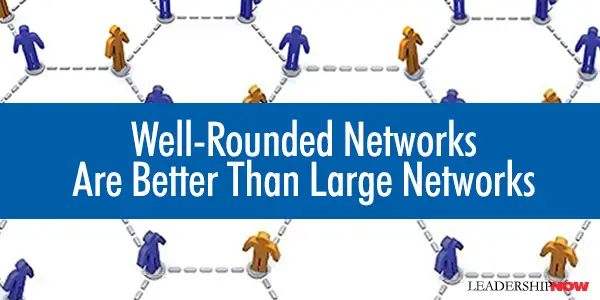 |
 |
08.19.09

Well-Rounded Networks Are Better Than Large Networks Rob Cross and Bob Thomas argue in Driving Results Through Social Networks that people who make targeted investments in relationships outperform those who simply build ever-larger networks. The former is based on quality the latter is a numbers game.
Rob Cross and Bob Thomas argue in Driving Results Through Social Networks that people who make targeted investments in relationships outperform those who simply build ever-larger networks. The former is based on quality the latter is a numbers game.
Leaders need to develop well-rounded networks. That is, networks that are not dominated by certain kinds of voices; people that are above them and below them, both inside and outside of the organization. The value here is in having the best possible and right kind of information available to you when you need it from people willing to tell you the truth. They have found that high performer's networks share three important dimensions:
They have developed an organizational network analysis to help make known the networks that exist in the informal organization. When trying to implement strategy, this becomes a crucial bit of information. If the informal networks are not aligned to the organizational objectives, the organization underperforms, and resources are not leveraged. A more nuanced view also allows for the creation of high-performing teams that do not naturally arise from the formal organization chart. This network perspective underscores the need for leadership at all levels of an organization: Whereas today we rely on two-dimensional, static, and notoriously outdated organization charts to depict what an organization is or does, soon we will be able to represent companies, even industries, the way they really are: active, in motion, growing, shrinking, flowing in the direction of opportunities, pulsating with life, and inevitably fading out of existence. This has implications for speeding productivity in newcomers: Leaders can capture greater productivity from their new hires by facilitating introductions between the newcomers and key resources as well as by ensuring that new employees quickly build a network of trusted relationships. Instead of asking only What do newcomers need to know? organizations must also ask, Whom do our newcomers need to know? 
Posted by Michael McKinney at 01:16 AM
|
BUILD YOUR KNOWLEDGE
 

How to Do Your Start-Up Right STRAIGHT TALK FOR START-UPS 
Grow Your Leadership Skills NEW AND UPCOMING LEADERSHIP BOOKS 
Leadership Minute BITE-SIZE CONCEPTS YOU CAN CHEW ON 
Classic Leadership Books BOOKS TO READ BEFORE YOU LEAD |